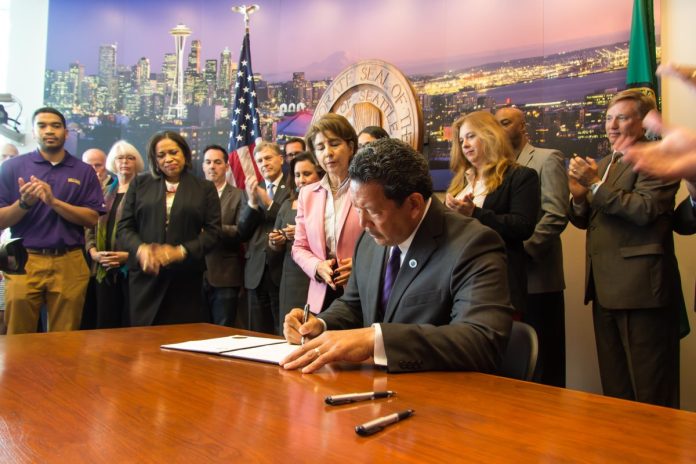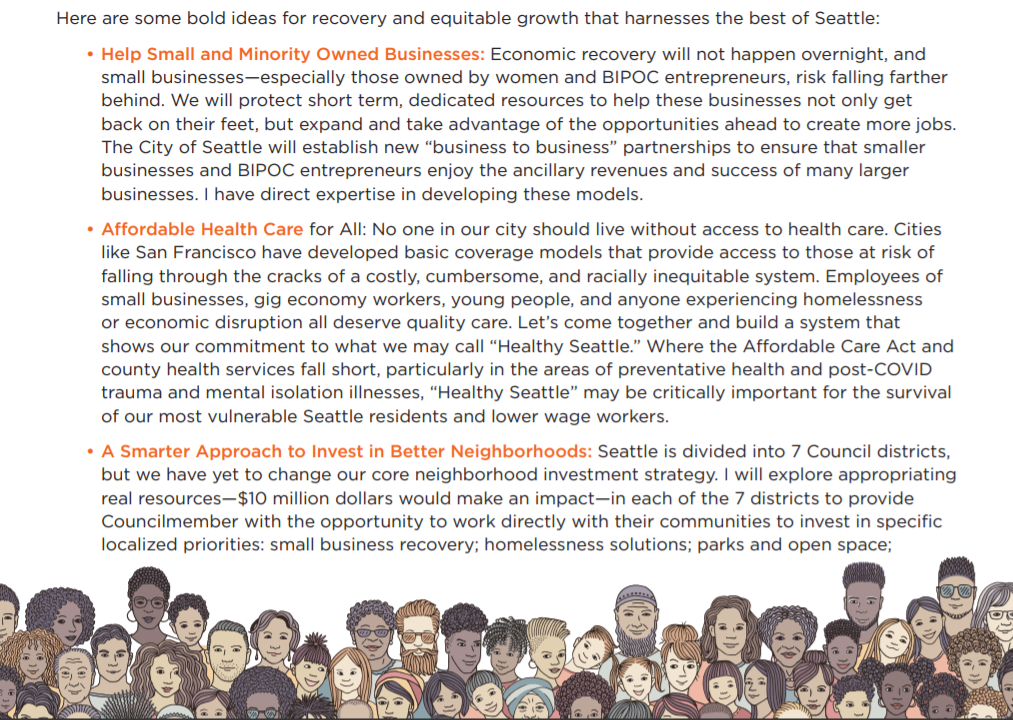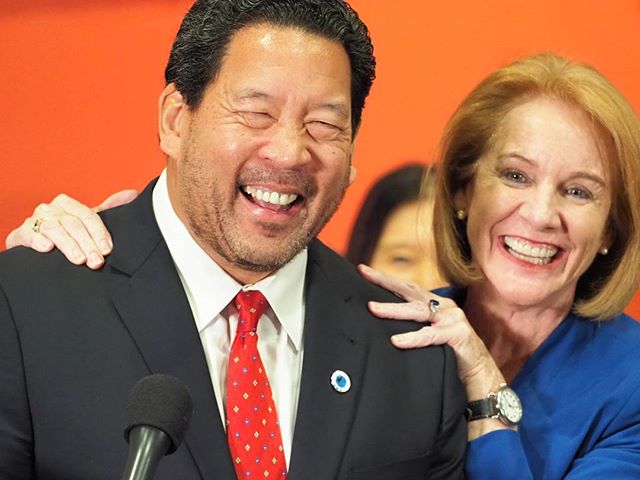Former City Councilmember Bruce Harrell announced his bid for Mayor of Seattle today. While light on policy specifics, the themes Harrell stressed included decreasing homelessness through a philanthropic push, police accountability, and fostering a pro-business environment. While portraying himself as a reformer, Harrell criticized the defund movement.
“We need to move beyond arbitrary and divisive public safety budget debates and align the needs of our entire community with the mandate of ending bias, improving response times, and reducing crime,” Harrell wrote in an open letter announcing his run. “We need the right kind of personnel to respond — like social workers and addiction specialists when an armed officer isn’t needed or appropriate. Accountability and training — and appropriate staffing for our growing city — require resources and reforms. We can do both.”
The three-term Councilmember did not seek reelection in 2019 and would have faced a tough opponent in Tammy Morales, who ended up winning Council District 2 with more than 60% of the vote–in 2015, Harrell bested Morales by just 345 votes. One of Harrell’s major rivals in the race is M. Lorena González, who succeeded him as Council President after he left the council. Other leading mayoral contenders include Chief Seattle Club Executive Director Colleen Echohawk and Andrew Grant Houston, who serves as Councilmember Teresa Mosqueda’s interim Policy Manager.
A business-friendly candidate
The business community seems bullish on Harrell and seemed be clearing a path for him to run.
“I’m hearing a lot of interest and intrigue about a potential candidacy by Bruce Harrell,” Downtown Seattle Association President and CEO Jon Scholes told the Puget Sound Business Journal in February.
Harrell also seems to be counting on business and nonprofit leaders to step in to help Seattle address homelessness. Rather than pledging additional City funds, Harrell suggested a philanthropic push.
“Let’s create a model where every resident and business can make tax deductive donations that go directly to homelessness and they can participate in community clothing drives, food distribution lines, clean-up work parties, resume drafting sessions, drug and alcohol treatment conversations and other activities that provide direct support to those experiencing homelessness,” Harrell wrote. “Our children will learn from our collective ability to show compassion.”
Harrell’s idea led opponent Andrew Grant Houston to quip, “GoFundMe isn’t a policy proposal.”
A nod to local control
One novel concept he advanced is bestowing each district-based councilmember with $10 million each to spend in their district as they and their community see fit. This sounds a bit like Your Voice, Your Choice program, dubbed transportation hunger games by some advocates, on steroids and opened up to other spending priorities like park space, small business recovery, and “cleanliness.”
Harrell’s interest in urbanist support is unclear — The Urbanist‘s invite to his announcement press conference appears to have gotten lost in the mail (it sounds like we will have an interview slot next week, at least). His council career didn’t necessarily point toward an urbanist bent. As The Stranger‘s Nathalie Graham pointed out, Harrell had been critical of upzones as a councilmember and preferring parking to transit-oriented development.
“Harrell was one of two council members to vote against increasing density around the Roosevelt light-rail station because it wasn’t appropriate to upzone an area where ‘neighborhood activists…put their heart and soul into neighborhood planning.'” Graham wrote. “On that tip, in 2013 Harrell told Capitol Hill Seattle Blog that more people would use the light rail if they could drive to the stations, and he advocated for more parking around light rail stations.”
His webpage hasn’t laid out specific initiatives on transportation beyond repairing the Magnolia Bridge and (continuing) to repair the West Seattle Bridge. “Continue investing in safe sidewalks and bike lanes while implementing Vision Zero concepts that will help keep every commuter safe,” reads one bulletpoint. “Push the boundaries of transportation innovation,” cryptically read another. “Work to expedite Sound Transit 3 [ST3] construction, explore groundbreaking potential proposals like Cascadia high-speed rail, and work with the Biden administration to secure funding for new and existing projects.
Mayor Jenny Durkan made similar promises of pursuing Vision Zero and expediting light rail construction in her 2017 run, but wasn’t always able to meet those pledges, punting on safety projects and letting ST3 timelines get pushed back. While her policy execution has often been lacking, Durkan has been fond of visioneering and framing of Seattle as a city of the future and a global leader, and Harrell is seeking to take up that baton.
“Seattle has always been an example for the nation — a progressive city where higher wages fueled greater equity and opportunity, where entrepreneurs were welcomed and nurtured, where investments in our parks, libraries, transit and affordable housing showed what a city can do when focused on a bright, inclusive future,” Harrell wrote.
Police reform redux
Though Harrell has distanced himself from Defund movement, he does propose reinvigorated police reform efforts. Among the grab bag of policy ideas in his letter is a pledge to personally recruit reform-minded police officers.
“I would like every sworn police officer in Seattle to watch the 8 minutes and 46 seconds of George Floyd’s murder in Minneapolis and voluntarily sign an open letter stating: The Inhumane Treatment of Fellow Human Beings Will Not Be Tolerated in Seattle,” Harrell wrote. “To further this mission, I will work to personally recruit officers looking to be internal change agents, heroes within the department to help coach, train, love and inspire our officers to be the department we all deserve.”
Harrell also said he was the first Seattle councilmember to call for police to wear body cameras. Harrell chaired the Council’s Public Safety Committee when Seattle’s Consent Decree was negotiated back in 2012 and was critical of Mayor Mike McGinn’s approach. At first, Harrell complained McGinn was too slow to sign the agreement, but he later urged him to ignore the Department of Justice’s deadline, arguing that getting sued by the Department of Justice could aid in the process of bringing the Seattle Police Department (SPD) in line.
Joining all councilmembers but Kshama Sawant, Harrell voted to approve the 2018 police contract that stripped out several of the accountability measures added to meet the Consent Decree. In the wake of George Floyd inspired protests, crackdowns, and scrutiny, the City seems to be gearing up to ratchet police accountability measures back up. That said, the contract seems very likely to drag into the next administration, with the Seattle Police Officers Guild defiant and openly feuding with the City.
Harrell spoke to his family’s experience overcoming racism; his Japanese-American mother lived through internment, and her family’s business in Capitol Hill was seized by the government. “My father’s family came here, like so many African Americans fleeing Jim Crow laws of the South, to find meaningful economic opportunity,” he wrote. “My dad found meaning — and friendships — in the Garfield High music program, performing with Quincy Jones, who later introduced him to my mom.”
Rather than inciting more interesting questions, Harrell’s Black and Japanese identity so far has led a KOMO reporter to ask him how he felt about Black-on-Asian crime. He didn’t seem thrilled about that line of inquiry, reported Erica Barnett, who noted the overwhelming majority of hate crimes in America are carried out by White people.
Part of Harrell’s challenge will be separate himself from the Durkan and Murray administrations enough to avoid answering for their shortcomings while keeping enough ties to recreate a very similar coalition as those previous two mayors forged to win election. A political ally of both Durkan and Murray, Harrell was one of the councilmembers to stick by Mayor Ed Murray as he faced numerous allegations of rape in 2017. He suggested since the incidents happened 33 years ago, it was not relevant and no big deal. Those remarks could come back to haunt him during the campaign.
Meanwhile, Harrell has taken steps to inoculate himself another line of attack. Property records show that Harrell — who has amassed a fortune north of $13 million practicing law — sold off his ritzy Downtown Bellevue condo. In 2015, Harrell portrayed that as an investment property rather than a residence of his, telling The Stranger he and his wife hadn’t slept there since 2011. So, sorry Bellevue, but the prospects of planting one of your own in Seattle City Hall seem to have faded.
Doug Trumm is publisher of The Urbanist. An Urbanist writer since 2015, he dreams of pedestrian streets, bus lanes, and a mass-timber building spree to end our housing crisis. He graduated from the Evans School of Public Policy and Governance at the University of Washington in 2019. He lives in Seattle's Fremont neighborhood and loves to explore the city by foot and by bike.






